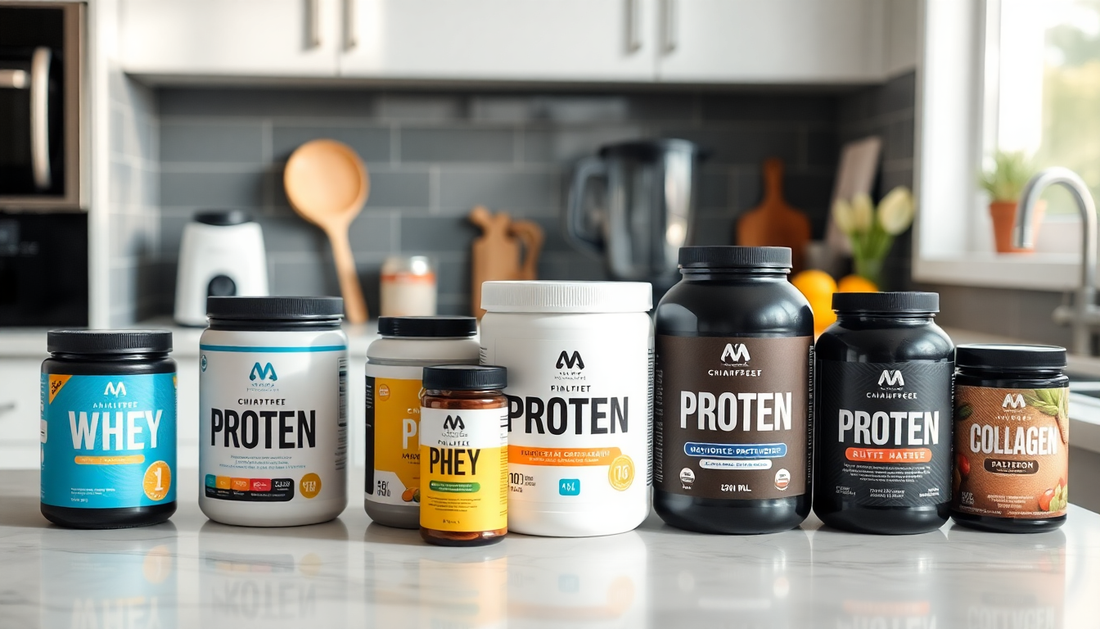
Protein Powders: Which One is Right for You Post-Surgery?
Share
Enhancing your well-being after surgery is crucial, and one of the most important aspects is ensuring you get the right amount of protein. Protein plays a vital role in tissue repair, muscle maintenance, and overall recovery. That's where protein powders can be a game-changer, providing a convenient and concentrated source of this essential nutrient.
At Vita4Life!, we've been committed to helping people like you achieve their health and wellness goals since 1996. Our fast-dissolving, filler-free vitamins and supplements are designed to meet the needs of active lifestyles, and we're excited to share our expertise on choosing the best protein powder for your post-surgery journey.
Post-Surgery Protein Needs
After undergoing any type of surgery, your body's protein requirements increase significantly. Protein is the building block for new cells and is essential for repairing damaged tissues, maintaining muscle mass, and supporting the immune system during recovery Johns Hopkins Medicine. Depending on the type of surgery, your healthcare provider may recommend a daily protein intake ranging from 60 to 120 grams or more. Meeting these elevated protein needs can be challenging, especially if you're dealing with reduced appetite or dietary restrictions. This is where a high-quality protein powder can be a valuable addition to your post-surgery nutrition plan.
Types of Protein Powders
When it comes to protein powders, there are several different types to choose from, each with its own unique benefits and considerations:
1. Whey Protein
Whey protein is a fast-absorbing complete protein derived from dairy, rich in branched-chain amino acids (BCAAs), which support muscle recovery and growth National Institutes of Health. Due to its high bioavailability and easy digestibility, whey protein is a popular choice for post-surgery patients.
2. Casein Protein
Casein protein is a slower-absorbing dairy protein that provides a sustained release of amino acids. It can help maintain muscle mass and is beneficial for overnight recovery Harvard Health.
3. Soy Protein
Soy protein is a plant-based option suitable for those with lactose intolerance or who prefer a non-dairy alternative. It's a complete protein and may offer benefits such as supporting heart health and reducing inflammation Cleveland Clinic.
4. Pea Protein
Pea protein is a hypoallergenic, plant-based protein that is easy to digest and rich in BCAAs. It's a good option for those with food sensitivities or allergies PubMed.
5. Collagen Protein
Collagen protein is derived from animal sources and is known for supporting skin, hair, nail, and joint health. While not a complete protein, collagen can be a valuable addition for those recovering from orthopedic procedures NIH.
Factors to Consider When Choosing Protein Powder
1. Digestibility and Absorption Rate
Look for a protein powder that is easy to digest and has a high absorption rate to ensure your body effectively utilizes the nutrients. Whey and pea proteins are generally well-tolerated and quickly absorbed Healthline.
2. Nutritional Profile
Examine the protein powder’s label for the amount of protein per serving, as well as other beneficial nutrients like vitamins, minerals, and healthy fats Mayo Clinic.
3. Taste and Texture
The protein powder you choose should taste pleasant and have a smooth texture, especially if you’ll be incorporating it into shakes, smoothies, or other recipes.
4. Allergies and Dietary Restrictions
If you have food allergies or restrictions (such as lactose intolerance or needing a gluten-free diet), choose a protein powder that meets those needs.
Best Protein Powders for Different Types of Surgery
1. Bariatric Surgery
For those who have undergone bariatric procedures, such as gastric bypass or sleeve gastrectomy, whey or pea protein powders can be excellent choices. These options are generally well-tolerated and provide a concentrated source of protein Obesity Action Coalition.
2. Orthopedic Surgery
If you’re recovering from orthopedic surgery, such as a joint replacement, collagen-based protein powder may be beneficial for supporting joint and connective tissue healing.
3. General Surgery
For general surgeries, versatile protein powders like whey, casein, or a blend can provide the comprehensive amino acids needed for overall recovery and muscle maintenance PubMed.
Incorporating Protein Powder into Your Post-Surgery Diet
Incorporating protein powder into your diet can be simple and effective. Aim for 20-30 grams of protein per serving, and consider mixing the powder into shakes, smoothies, or soups. Start with smaller servings and increase gradually as your body adjusts Cleveland Clinic.
Potential Side Effects and Precautions
Protein powders are generally safe, but you may experience digestive discomfort, bloating, or allergic reactions. Always consult your healthcare provider for personalized advice, as exceeding recommended protein intake could lead to complications like kidney strain Harvard Health.
Conclusion
Protein powders can be an invaluable tool for post-surgery recovery, providing the concentrated nutrients your body needs to heal and thrive. Understanding the different types and factors to consider will help you make an informed choice. At Vita4Life!, we’re here to support you on your recovery journey. If you have any questions, feel free to reach out for personalized guidance on choosing the right protein powder for your needs.
Medical Disclaimer
The information provided in this article is for educational purposes only and is not intended as medical advice. Always consult with your healthcare provider before making significant changes to your diet, including the introduction of new supplements or protein powders.
